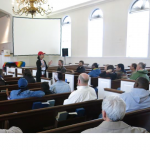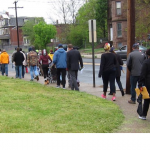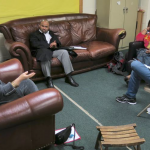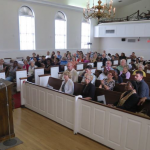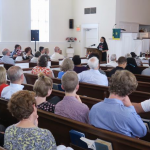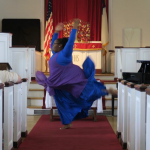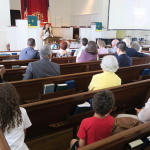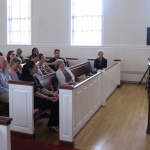Luke 10:25-37
Cynthia Jarvis
July 10, 2016
“‘Which of these three, do you think, was a neighbor to the man who fell into the hand of robbers?’ He said, ‘The one who showed him mercy.’ Jesus said to him, ‘Go and do likewise.’”
Needless to say, we have endured yet another week when the quality of mercy has been strained to the point of breaking by the inequality of power and fear and race and death over our common life. Lest we be tempted, once again, to walk on by the beaten, the stripped, the abandoned, and the half dead by the side of the road when we leave this temple, Jesus told a parable about the one who showed mercy.
The Greek word translated as pity or compassion or mercy in the New Testament is curiously a word used only of Jesus himself and of three familiar characters in Jesus’ parables: the father of the prodigal, the magnanimous king who has mercy toward a hopeless debtor, and the Samaritan. This is not the mercy or pity or compassion that corresponds to the movements of our merely human hearts. This is a movement in the bowels of God — a movement of the innermost being of God, a movement that is the movement of God toward us in Jesus Christ.
Of God’s mercy, Karl Barth writes: “[God] does not merely help from without…standing alongside, making a contribution and then withdrawing again and leaving [us] to [our] selves until further help is perhaps required. [Rather in Jesus Christ] he interposes himself for [us], he gives himself to [us]… he puts himself in [our] place… he makes [our] state and fate his own cause, so that it is no longer [ours] but his…” This sounds to me, for all the world, like the Samaritan in the story!
But God is merciful not only in relation to us: the God who is merciful is merciful from all eternity. God is merciful in God’s self. “God who is rich in mercy,” I often declare when I am privileged to pronounce the promise of the gospel; or “God is merciful and gracious, slow to anger and abounding in steadfast love”; or “Blessed be the God and Father of our Lord Jesus Christ, the Father of mercies and the God of all comfort.” God’s very being is mercy. How do we know this? Barth admits that “When we confess God to be merciful, it is not even remotely possible to demonstrate this as a logically deducible truth.” We can only confess that God has given Himself to be known by us as merciful in the name of Jesus Christ. We can only try to recognize the reality of the mercy of God in his name.
The story before us has something to do with recognizing the reality of the mercy of God on the road going down from Jerusalem to Jericho. Interrupting a private conversation Jesus is having with the seventy just returned from their first missionary journey, the lawyer asks Jesus, in order to test him, “Good teacher, what I must do to inherit eternal life?” Contained in his question are assumptions about God and about eternal life that we would do well to examine.
There are, Robert Jenson says, “as many eternities as there are… cultures and faiths, but most eternities can be divided into two sorts.” The first sort is secured by law and the second is confessed by promise. The first, secured by law, is the eternity of persistence. “The average God,” Jenson says, “is eternal in this way.” This is the God of religion — “the universal Conserver… the Rock of Ages, the Sheltering Arms, the transcendent Security Blanket” — who “can both guarantee the barns that defend our status quo; and provide a refuge when the status quo becomes too threatening.” In this eternity of timelessness, “the Immutability [the unchangability] of the past settles what can come of the future and so rules time as God: because of what I have accomplished, I can count securely on such-and-such, or because of what I have done, guilt closes such-and-such doorways.” In other words, this average God eternally “guarantees our securities and assigns our guilt; [God is]… the super Bookkeeper who will let us ‘into heaven’ if only we do our best, and are sincerely sorry and try harder from now on.”
The dead giveaway that the lawyer had the average God in mind when he came to test Jesus was the verb he used in his question: What must I do to inherit eternal life? What must I do to be given eternal life as my secure possession? The average God acts to assure the lawyer on the basis of the law as gospel that his status eternally, for good or for ill, depends on his immutable past.
The second sort of eternity is confessed by promise and anticipated in hope. In this eternity the “future [of the God who is rich in mercy] endlessly overcomes all bondage to the past… it is the eternity in which [you and I] are free, exactly in and by what [we] already are, for what [we] are not yet. The God of Israel and of Jesus’ resurrection is eternal in this way,” Jenson says. In God’s eternity of mercy, God even uses the guilt we hold on to from our past as the occasion to do a new thing; and God scandalously uses hope to undo the other eternity’s timeless stasis of good and bad, in and out, justice and injustice, Jew and Samaritan.
Therefore to the lawyer’s question concerning what he must do to secure the eternal life of the average God, Jesus counters with a question concerning the lawyer’s future with the God of mercy. Citing the summary of the law in Deuteronomy and Leviticus, the lawyer says he is to love God with all of his heart and soul and strength and mind and his neighbor as himself. “Right you are!” says Jesus. “Do this and you will live.” “Do exactly what?” the lawyer still wants to know. What is the more and the less he must do in order to assure the average God that I have done what is necessary. “Precisely which ones must I love?”
In response, Jesus answers a question the lawyer did not have it in him to ask. To wit: Who will he finally become? Who will he be in the eternity of the God who is mercy? To answer this question, Jesus abandons abstract principles for a story that turns out to be about mercy: “A man was going down from Jerusalem to Jericho,” it begins. No telling who this man is, what tribe he belongs to, what God he worships or what characterizes his human condition other than the vulnerability written all over his face that is written over ours as well. Stripped, beaten, left for dead, he is at the mercy of everyone who passes by. If you are black and male in this nation, every road is the Jericho road. Think Michael Brown, Eric Garner, Laquan MacDonald, Tamir Rice, Antonio Zambrona-Montes, Eric Harris, Walter Scott, Freddie Gray, Alton Sterling, Philando Castile, to name a few.
When I lived here for fifteen years, twenty years ago, I played a mental game with myself. I drove the streets of Princeton and every time I saw a car stopped by a policeman, I bet myself $1,000 the driver is black. About nine times out of ten, I was right. I still play that game where I live. I live in a suburb of Philadelphia. On my way to church, I go by way of a speed trap and I know to do twenty-five miles per hour. And every time somebody is stopped by the side of the road, I bet myself $1,000 the driver is black. I would say nineteen times out of twenty. Nassau Street is the Jericho Road. Witherspoon Street, the Jericho Road. Bayard Lane, the Jericho Road. Mermaid Lane, Philadelphia, the Jericho Road. Germantown Avenue, where my church sits, is the Jericho Road.
Yet Thursday night was a brutal reminder that those we send out to patrol the Jericho Road daily walk in the valley of the shadow of death where showing mercy seems to be a matter of life and death.
The people passing by are identified, though we do not know why they do what they do. The priest and the Levite see the man and keep on going. The usual excuse given for them — that they are concerned with ritual purity — does not avail because they are going “down” the road and so away from the temple. We simply do not know why they keep going, just as sometimes do we know the same about our own deficit of mercy in the face of the brutality that our common life has become.
The Samaritan sees the man as well. The Samaritans, you may remember, had just refused to receive Jesus in Luke’s last chapter. At this point in the story, Jewish New Testament scholar Amy-Jill Levine insists that “we should think of ourselves as the person in the ditch and then ask, ‘Is there anyone, from any group, about whom we would rather die than acknowledge, ‘She offered help,’ or ‘He showed compassion’?” Likewise, is there any group whose members might rather die than help us? If so, then we know how to find the modern equivalent for the Samaritan.” In this xenophobic time, the candidates are legion. Levine proceeds to be more specific than the lawyer ever imagined when he asked his question of Jesus. Who is the one who proved neighbor — who loved God with heart, soul, strength, mind and the neighbor as the self? For Levine as a Jew it is a member of Hamas who showed mercy. In a lecture on the same parable at Auburn Seminary, I was in an audience filled with people who recently had experienced the horrors of September 11th firsthand when Levine suggested that the one who proved neighbor was a member of Al-Qaeda.
So the Samaritan on the road from Jerusalem to Jericho sees the man as well, but here we come upon the word with which we began. He is moved with pity, with compassion, with mercy: it is the verb that is used only of Jesus, the father of the prodigal, the king of the debtor and now the Samaritan. He not only feels in his bowels, in the deepest part of his being, the misery and distress of this man; he also acts, mercy being an action determined by a feeling. He binds the man’s wounds, pouring oil and wine on them — elements used in the daily temple sacrifice; he puts the man on his own animal in order to bring him to an inn; there he gives the innkeeper enough money to keep him for two months and says, “Take care of him….” To repeat, the Samaritan “does not merely help from without… standing alongside, making a contribution and then withdrawing again… leaving him to himself until further help is perhaps required. [Rather] he interposes himself for the man, he gives himself to him… he puts himself in his place… he makes his state and fate his own cause, so that it is no longer the man’s but his own.”
Then finally, the Samaritan stands for the man’s future freedom. He says, “When I come back, I will repay you whatever more you spend.” As the man had nothing now but what the Samaritan had given him, he could have been “at the mercy” (so to speak) of the innkeeper — a profession with the reputation for dishonesty and violence — who eventually could have enslaved him for any unpaid debt. If it is mercy you mean to show and if it is the eternity of the God who is mercy that you hope to inhabit more than inherit, then as my former New Testament professor John Donahue put it, you “must enter the world of the injured not only with care and compassion but must leave it in such a way that the injured is given freedom.”
“Which of these three, do you think, was a neighbor to the man who fell into the hands of robbers?” The lawyer said, because he could not bring himself to say Samaritan, “The one who showed him mercy.”
What would it be for those of us in this sanctuary who are white to not only feel in our bowels, in the deepest part of our being, the misery and distress of black men and their mothers and their spouses and their children, but also to act, mercy being an action determined by a feeling. What would it look like for us not merely to help from without… standing alongside, making a contribution and then withdrawing again… leaving our black brothers and sisters to themselves until the next spate of killings. What would be different if we interposed our white selves for black selves, giving ourselves to them… putting ourselves in their place… making their state and fate our own cause, so that it is no longer theirs but our own? What would it be for us to bear witness to the God who enters the world of the injured not only with care and compassion but leaves it in such a way that the injured is given freedom? Who would our future selves be, our future nation be, if we gave ourselves to the God who uses the guilt we hold on to from our past as the occasion to do a new thing. If we gave our racist and xenophobic and fearfully defended selves to the God who scandalously uses hope to undo the timeless stasis of good and bad, in and out, justice and injustice, Jew and Samaritan, black and white, rich and poor, citizen and immigrant, saved and lost?
“Go and do likewise,” Jesus finally said. We do not know what became of the lawyer. We can only ask after the persons we may become in the hands of the God of mercy, beseeching God to have mercy on us. Amen.
© 2016
Contact the church to obtain reprint permission.










